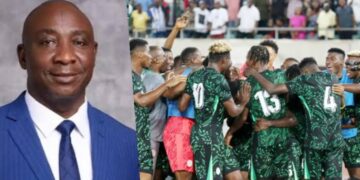The government attributed the assault to the opposition PSF led by Yaya Dillo, who denied the accusation.
Heavy gunfire has echoed through the streets of Chad’s capital, N’Djamena, on Thursday following a deadly attack on the headquarters of the National Security Agency (ANSE).
The government has attributed the assault to the opposition Socialist Party Without Borders (PSF), led by Yaya Dillo, who vehemently denied the accusation.
Wednesday’s attack resulted in several casualties, with conflicting accounts emerging from both the government and the PSF.
Government officials, including Communication Minister Abderaman Koulamallah, allege that Yaya Dillo orchestrated the assault.
However, Dillo called the accusation a “lie” and claimed it was an attempt to intimidate him ahead of the upcoming presidential elections scheduled for May 6.
Residents of N’Djamena reported intense gunfire near the PSF’s main office, and witnesses mentioned the cordoning off of PSF buildings.
The PSF’s general secretary contradicted the government’s claim, stating that PSF members were attacked by soldiers while attempting to retrieve the body of their colleague Ahmed Torabi.
Torabi, allegedly involved in an attempt to assassinate the president of the Supreme Court, was reportedly arrested and shot dead on Tuesday.
The political turmoil adds complexity to Chad’s electoral landscape, with President Mahamat Déby set to run in the upcoming elections.
Déby, who assumed power in 2021, pledged a return to civilian rule but faced delays in implementing the transition. The opposition, including Yaya Dillo, views the electoral commission with skepticism, expressing concerns about the perpetuation of the Déby dynasty.
In the midst of the unrest, internet connectivity has been disrupted in the country, as reported by internet watchdog Netblocks. President Déby’s cousin, Yaya Dillo, a vocal opponent, claims the military has sought him at his party headquarters.
The international community, notably former colonial power France, has been closely watching Chad’s political developments.
France has supported President Déby during the transition, leading to speculation and criticism within and outside Chad. The country currently hosts about 1,000 French troops engaged in counter-terrorism efforts across West Africa.
As the situation unfolds, Chad faces a critical juncture on its path to democratic governance, with the upcoming elections intended to conclude the political transition. The government warns that those attempting to disrupt the democratic process will face prosecution, further intensifying the political climate in this Central African nation.




































